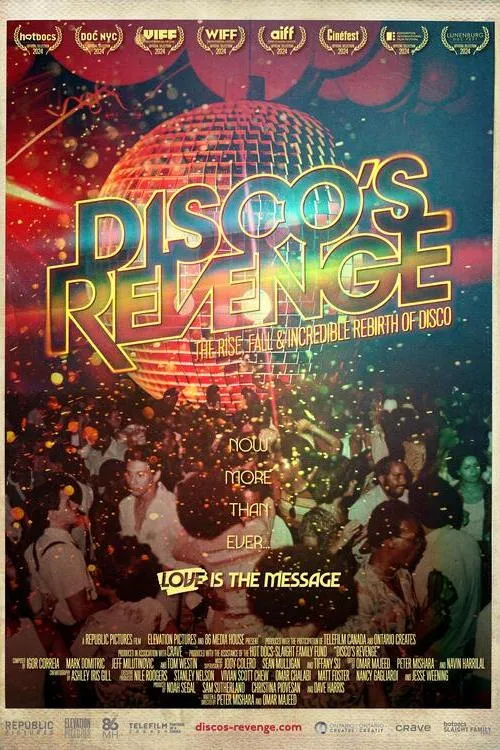Disco’s Revenge

Plot
In the late 1960s and early 1970s, amidst the vibrant backdrop of the Civil Rights Movement and the Stonewall Riots, a new sound began to rise from the underground clubs of New York City. Disco, a genre born of funk, soul, and Latin American music, was initially the soundtrack to resistance and revolution. Born out of the need for self-expression, community, and identity among marginalized groups, disco pulsed with the energy of a movement. At its core, disco was never just about music; it was a cultural phenomenon that defied the boundaries of traditional norms and social conventions. Discotheques, like Studio 54, became havens for those seeking acceptance, inclusivity, and a sense of belonging. These spaces were a fusion of music, art, and self-expression, where patrons could shed their inhibitions and celebrate their individuality. Disco's message of freedom, empowerment, and social change was a radical departure from the stifling norms of mainstream culture. Its infectious beats and flamboyant fashion styles allowed people to express themselves with unbridled joy, and its lyrics often conveyed a call to action, urging listeners to challenge the status quo. One of the key figures of the disco era was a young woman named Lea. Born into a community struggling for survival and self-expression, Lea discovered the power of disco early on. She would spend hours in the clubs, watching the DJs weave their magic, and bask in the collective energy of the crowd. As she grew older, Lea became increasingly involved in the underground scene, organizing rallies and protests that incorporated disco music as a form of resistance. One of Lea's closest friends, a charismatic and confident individual named Z, had a natural talent for performance. Z would take to the stage at various clubs and parties, using disco as a means to spread their message of love and acceptance. Their electrifying presence helped fuel the growing popularity of disco, drawing in new fans from all walks of life. However, as disco began to gain momentum, it attracted the attention of mainstream media and the music industry. Commercialization was inevitable, and the raw, unbridled energy of the underground scene began to dissipate. Disco's initial purpose – a powerful tool for social change and self-expression – was lost in the shuffle. Mass-market appeal took hold, and disco was co-opted and homogenized. The once-vibrant colors and bold fashion statements were replaced with the ubiquitous image of John Travolta's strut and the generic aesthetic of Swedish tracksuits. Disco, once an authentic reflection of marginalized communities, had become a watered-down imitation of its former self. The tension between the original underground scene and the now-mainstream, commercialized version of disco began to simmer. Lea and Z, once proud promoters of the genre's radical politics, found themselves increasingly disillusioned with the sanitized, homogenized version of disco that had taken hold. As the music continued to spread, it lost its true connection to the communities that had birthed it. Disco, once a powerful call to action, had become a mere novelty, a fleeting fad to be exploited by the music industry. The narrative of Disco's Revenge becomes a poignant commentary on the perils of cultural appropriation and the commodification of marginalized voices. Disenchanted and disillusioned, Lea and Z become determined to reclaim the true essence of disco – its power, its passion, and its purpose – and breathe life back into the dying embers of a revolution that had lost its way. Through their efforts, we are reminded of the enduring legacy of disco as a cultural force. Its original purpose – a call to action, a celebration of identity, and a beacon of hope in a world dominated by oppression – remains a testament to its resilience and its continued relevance. The story of Disco's Revenge serves as a poignant reminder that the struggle for social justice and the pursuit of self-expression are ongoing, and that even in the face of mainstream co-optation, radical voices can still be heard, and a movement still be reborn.
Reviews
Recommendations



